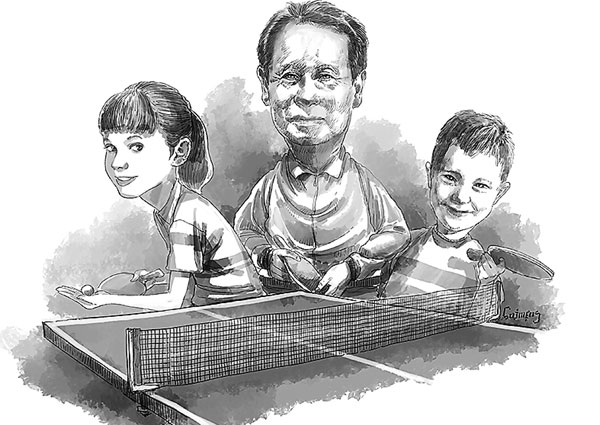Chinese coach bounces around world
By Mao Xi for China Daily ( China Daily ) Updated: 2014-12-27 07:50:54
 |
|
[Image by Cai Meng/China Daily] |
For Wang, the Belgian players always finished their practice sessions too early. Chinese ping-pong athletes train long and hard, and they spend huge amounts of time on the "boring" basics. They may be seen by foreign players as "machines", but that would not accurately sum up how much hard work and dedication they put in.
On his first morning with the Belgian national team, Wang asked the players to train on a set of movements for 20 minutes. The players shrugged him off, saying they could train only for seven minutes. They compromised on training for eight minutes, but Wang repeated the same session in the afternoon so that the total training for the single set added up to 16 minutes, still four minutes shy of his goal for them.
Wang says he was pretty shocked by this lack of work ethic. It was quite a different interpretation of the relationship between coaches and players. In China, coaches serve as masters while the players are the disciples, based on mutual trust. The disciples normally and unconditionally obey the coaches. The Belgian players regarded this as "blindly following" the coaches.
There were other differences. Chinese ping-pong is results-oriented, making their matches short, flexible and fast. Many Chinese players spend months working on serving techniques as a winning strategy flipping and spinning while European players prefer graceful spinning and driving performances on the table.
But Jean-Michel Saive soon adapted to this new kind of relationship, and Wang became his "coach, friend and second father", he says.
"Few coaches and players have a relationship of more than 20 years. What is important is that we have stayed together not only in the good moments but also in the dark moments, when we try to catch up with the fast-changing techniques and rules in table tennis," Saive says.
He also learned from Wang some small details that European players often ignored: different variations of serving, how to read the spin in the service of the ball, how to play around the net.
The two complemented each other. Saive is young, energetic and screams a lot during the games, while Wang is more mature and is always there to cool him down. But the biggest thing about training with Wang is that it has given Saive an opportunity to understand what the Chinese think of European players and see the possibility of winning some top matches. In 1994 and 1995, Saive ranked No 1 in the world.
Wang was a pioneer of the overseas legion of Chinese coaches who left to coach foreign players. He had reasons to leave China: There were too many capable coaches there.
|
|
|
|
|
|
|
|

























 Raymond Zhou:
Raymond Zhou: Pauline D Loh:
Pauline D Loh: Hot Pot
Hot Pot Eco China
Eco China China Dream
China Dream China Face
China Face






